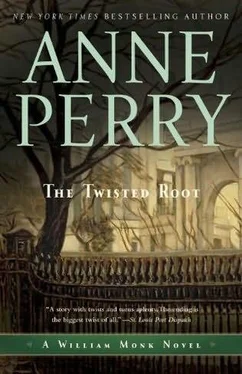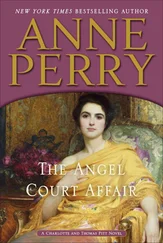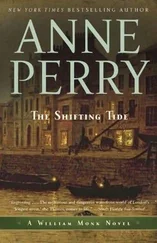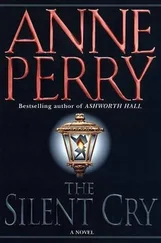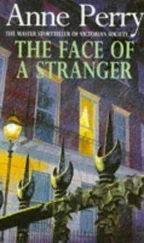Anne Perry - The Twisted Root
Здесь есть возможность читать онлайн «Anne Perry - The Twisted Root» весь текст электронной книги совершенно бесплатно (целиком полную версию без сокращений). В некоторых случаях можно слушать аудио, скачать через торрент в формате fb2 и присутствует краткое содержание. Жанр: Исторический детектив, на английском языке. Описание произведения, (предисловие) а так же отзывы посетителей доступны на портале библиотеки ЛибКат.
- Название:The Twisted Root
- Автор:
- Жанр:
- Год:неизвестен
- ISBN:нет данных
- Рейтинг книги:5 / 5. Голосов: 1
-
Избранное:Добавить в избранное
- Отзывы:
-
Ваша оценка:
- 100
- 1
- 2
- 3
- 4
- 5
The Twisted Root: краткое содержание, описание и аннотация
Предлагаем к чтению аннотацию, описание, краткое содержание или предисловие (зависит от того, что написал сам автор книги «The Twisted Root»). Если вы не нашли необходимую информацию о книге — напишите в комментариях, мы постараемся отыскать её.
The Twisted Root — читать онлайн бесплатно полную книгу (весь текст) целиком
Ниже представлен текст книги, разбитый по страницам. Система сохранения места последней прочитанной страницы, позволяет с удобством читать онлайн бесплатно книгу «The Twisted Root», без необходимости каждый раз заново искать на чём Вы остановились. Поставьте закладку, и сможете в любой момент перейти на страницу, на которой закончили чтение.
Интервал:
Закладка:
Monk found himself increasing his pace, dodging between pedestrians out strolling in the warm midmorning; peddlers offering sandwiches, toffee apples and peppermint drinks; and traders haggling over a good bargain. He barely saw them. The noise muted into an indistinguishable buzz. He wanted to get this over with.
He walked up the hospital steps and in at the wide, front entrance. Almost immediately he was greeted by a young man in a waistcoat and rolled-up shirtsleeves stained with blood.
"Good morning, sir!" he said briskly. "Is it a physician or a surgeon you require? What can we do for you, sir?"
Monk felt a wave of panic and quashed it with a violent effort. Thank God he had need of neither. The stoicism of those whose pain brought them here earned his overwhelming admiration.
"I am in good health, thank you," he said quickly. "I should like to see Lady Callandra Daviot, if she is here."
"I beg your pardon?" The young man looked nonplussed. It had obviously never occurred to him that anyone should wish to see a woman, any woman, rather than a qualified medical man.
"I should like to see Lady Callandra Daviot," Monk repeated very distinctly. "Or, if she is not here, then Mrs. Monk. Where may I wait?" He hated the place. The gray corridors smelled of vinegar and lye and reminded him of other hospitals, the one where he had awoken after the accident, not knowing who he was. The panic of that had long since receded, but it was too easily imagined again.
"Oh, try that way." The young man waved airily in the general direction of the physicians’ waiting room, then turned on his heel and continued the way he had been going.
Monk went to the waiting room, where half a dozen people sat around, tense with apprehension, too ill or too anxious to speak to one another. Mercifully, Callandra appeared after only a few moments.
"William! What are you doing here? I presume you wish to see Hester? I am afraid she is out. She has gone"-she hesitated-"to see a patient."
"Old and ill and poor, I imagine," he replied dryly.
She knew him too well. She caught the edge of deeper meaning in his voice. "What is it, William?" she demanded. Although he had naturally risen to his feet, and he was some eight inches taller than she, she still managed to make him feel as if he should respond promptly and truthfully.
"I believe you have been missing certain medicines from the apothecary’s rooms." It was a statement.
"Hester never called you in on the matter?" She was amazed and openly disbelieving.
"No, of course not. Why? Have you solved the problem?"
"I don’t think you need to concern yourself with it," she answered severely. "At least certainly not yet."
"Why? Because it is a nurse who has taken them?" That was only half intended to be a challenge, but it sounded like one.
"We do not know who it is," she replied. "And since you agree that Hester did not ask you to investigate for us, why are we discussing the matter? You can have no interest in it."
"You are wrong. Unfortunately, I do have." His voice dipped, the previous moment’s confrontation suddenly changed to sorrow. "I wish I could leave it alone. It is not the fact that you are missing them that concerns me, it is the chance that whoever took them may have been blackmailed over the thefts, even though I believe she put them to the best possible use."
"Blackmail!" Callandra stared at him in dismay.
"Yes … and murder. I’m sorry."
She said nothing, but the gravity in her face showed her fear, and he felt that it also betrayed her guess as to what else lay beyond the thefts, to the steady draining away of supplies over months, perhaps years, to help those she perceived to be in need. It was a judgment no individual had the right to make, and yet if no one did, who would care and who would break the rules in order to show that they should be changed?
"Do you know who it is?" he asked.
She looked him straight in the eye. "I have not the slightest idea," she replied. They both understood it was a lie and that she would not change it. He did not really expect her to, nor would he have been pleased if she had.
"And neither has Hester!" she added firmly.
"No … I thought not," he conceded with the ghost of a smile. "But you can give me an estimate as to how much and of which sorts."
She hesitated.
"Surely you would prefer to do that yourself than for me to have to ask someone else?" he said without blinking.
She realized it was a threat, very barely disguised. He would carry it through no matter how much he would dislike it.
"Yes," she capitulated. "Come with me and I will give you a list. It is only a guess, of course."
"Of course," he agreed.
Monk worked the rest of that day, and most of the following one, first with Callandra’s list of medicines, then seeing whom Cleo Anderson had visited and what illnesses afflicted them. He did not have to ask many questions among the sick and the poor. They were only too happy to speak well of a woman who seemed to have endless time and patience to care for their needs, and who so often brought them medicines the doctor had sent. No one questioned it or doubted where she had obtained the quinine, the morphine, or the other powders and infusions she brought. They were simply grateful.
The more he learned, the more Monk hated what he was doing. Time and again he stopped short of asking the final question which could have produced proof. He wrote nothing down. He had nothing witnessed and took no evidence of anything with him.
On the afternoon of the second day he turned his attention to Cleo Anderson herself, her home, her expenses, what she purchased and where. It had never occurred to him that she might ask any return for either the care she gave or the medicines she provided. Even so, he was startled to find how very frugal her life was, even more so than he would have expected from her nurse’s wages. Her clothes were worn thin and washed of almost all color. They fitted poorly and presumably had been given to her by grateful relatives of a patient who had died. Her food was of the simplest-again, often provided in the homes of those she visited: bread, oatmeal porridge, a little cheese and pickle. It seemed she frequently ate at the hospital and appeared glad of it.
The house was her own, a legacy from better times, but falling into disrepair and badly in need of reroofing.
No one knew her to drink or to gamble.
So where did her money go?
Monk had no doubt it went into the pocket of James Treadwell, at least so long as he had been alive. Since his death just two weeks before, Cleo Anderson had purchased a secondhand kitchen table and a new jug and bowl and two more towels, something she had not been known to do in several years.
Monk was in the street outside her house a little before half past four when he saw Michael Robb coming towards him, walking slowly as if he was tired and his feet were sore. He was obviously hot, and he looked deeply depressed. He stopped in front of Monk. "Were you going to tell me?" he asked.
There was no need for explanation. Monk did not know whether he would have told him or not, but he was quite certain he hated the fact that Robb knew. Perhaps it was inevitable, and when he had wrestled with it and grieved over it he would have told him, but he was not ready to do that yet.
"I have no proof of anything," he answered. That was uncharacteristically vague for him. Usually he faced a truth honestly, however bitter. This hurt more than he had foreseen.
"I have," Robb said wearily. "Enough to arrest her. Please don’t stand in my way. At least we will release Miriam Gardiner. You can tell Mr. Stourbridge. He’ll be relieved … not that he ever thought her guilty."
"Yes …" Monk knew Lucius would be happy, but it would be short-lived, because Miriam had chosen to face trial herself rather than implicate Cleo Anderson. Her grief would be deep, and probably abiding.
Читать дальшеИнтервал:
Закладка:
Похожие книги на «The Twisted Root»
Представляем Вашему вниманию похожие книги на «The Twisted Root» списком для выбора. Мы отобрали схожую по названию и смыслу литературу в надежде предоставить читателям больше вариантов отыскать новые, интересные, ещё непрочитанные произведения.
Обсуждение, отзывы о книге «The Twisted Root» и просто собственные мнения читателей. Оставьте ваши комментарии, напишите, что Вы думаете о произведении, его смысле или главных героях. Укажите что конкретно понравилось, а что нет, и почему Вы так считаете.
